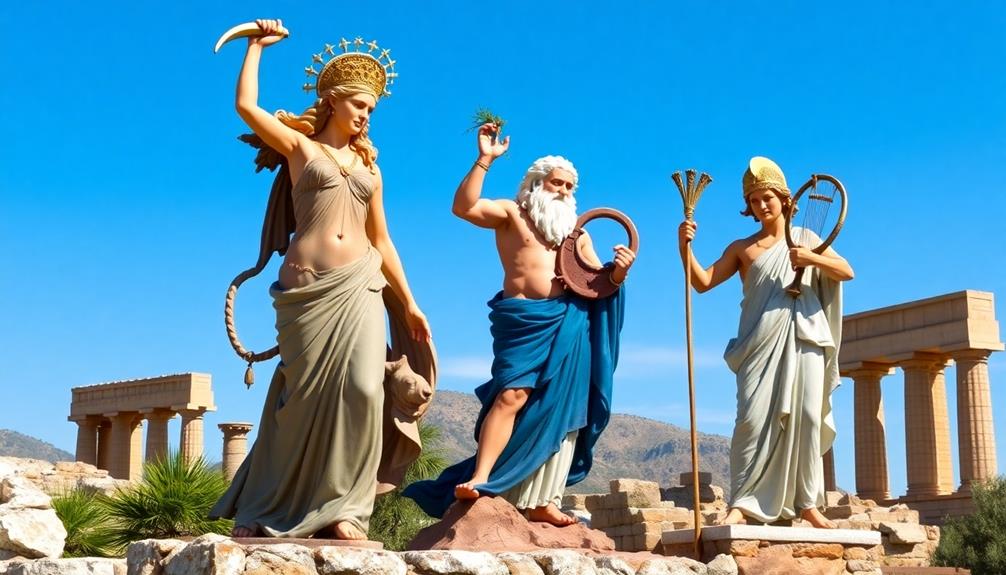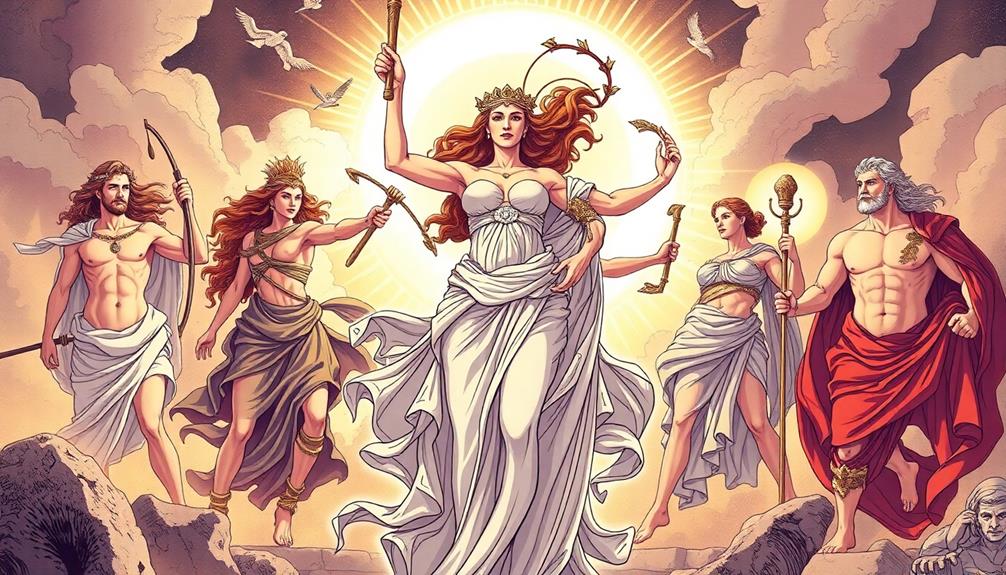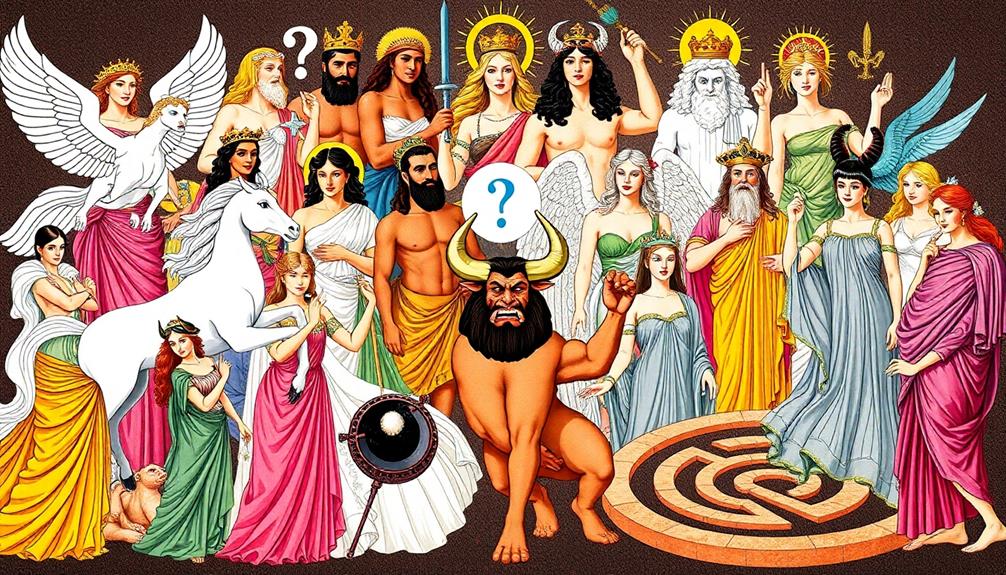Greek mythology is packed with misconceptions that distort your understanding of its rich narratives. You'll often see deities as merely good or evil, but they embody complex human traits. Take Medusa, for instance; her tragic story of victimization is frequently overlooked. Ares, the god of war, isn't just a mindless aggressor; he shares emotional depth and respect for Athena. The Trojan War isn't merely a myth either; it's rooted in real events influenced by divine intervention. Recognizing these truths reveals much about human nature and societal dynamics, so stick around to uncover even more fascinating insights!
Key Takeaways
- Greek deities embody complex emotions, with figures like Ares and Hades often misrepresented as purely evil or villainous.
- Medusa's transformation into a monster is a tragic punishment for victimization, not a reflection of inherent monstrosity.
- Ares is not just a symbol of aggression; his relationships and respect for wisdom reveal deeper layers of his character.
- The Trojan War's narrative is intertwined with historical events and divine influences, challenging the perception of it as purely mythical.
- Gender dynamics in Greek myths reflect societal tensions, with female figures often punished for male actions, highlighting historical gender biases.
Misunderstanding Greek Deities

Many people misunderstand Greek deities, viewing them as simply good or evil figures. In reality, Greek gods embody complex human emotions and traits.
Take Ares, for instance; while he's often seen as a villain, he's also impulsive and frequently humiliated, showing a duality that goes beyond mere evil.
You might also think Hades is a malevolent ruler of the underworld, but he didn't choose that role. Instead, he's misunderstood, with demigods like Hermes and Charon managing the redemption of souls.
Even the goddess of love, Aphrodite, is often oversimplified. Sure, she represents beauty and romance, but she's got a warrior side too, especially in her relationship with Ares, which reveals another layer to her character.
These misunderstandings can lead to a skewed perception of these deities and their narratives.
The Truth About Medusa

Unraveling the truth about Medusa reveals a story far more complex than the monstrous figure often depicted in popular culture. Medusa isn't just a Gorgon with snakes for hair—she's the only mortal sister among Stheno and Euryale. Her transformation into a monster wasn't a choice; it was a punishment from Athena after Poseidon violated her in Athena's temple. This act emphasizes themes of victimization that are often overlooked.
Instead of being seen as a villain, Medusa's tragic existence reflects the consequences of the gods' whims. When people gaze directly at her, turning to stone, it symbolizes her own petrified state, trapped in a monstrous form due to circumstances beyond her control.
In modern culture, Medusa's legacy has been overshadowed and reduced to a mere symbol of monstrosity, ignoring the depth of her story. By understanding Medusa's background, you can appreciate her as a victim of divine cruelty rather than a simple monster.
Her tale serves as a reminder of the complexities of mythology, urging you to look deeper into the narratives that shape our understanding of these ancient figures.
Ares and His Complexity

Amidst the clamor of battle, Ares, the Greek god of war, emerges as a figure shrouded in misunderstanding. While many view him as a relentless force of aggression, there's more beneath the surface. His relationship with his sister Athena provides a glimpse into his complexity, showcasing moments of respect for her strategic prowess in warfare.
| Ares' Traits | Description |
|---|---|
| Aggression | Often depicted as impulsive and chaotic |
| Loyalty to Athena | Shows deference to her strategies |
| Emotional Vulnerability | His affair with Aphrodite reveals a softer side |
In the Iliad, Ares acknowledges Athena's wisdom, contrasting with the image of a mindless warrior. His tumultuous love life highlights his humanity and vulnerability, often leading to moments of humiliation. Moreover, Ares isn't universally worshipped; he's frequently seen as an outsider among the gods. This outsider status emphasizes the complexities of his character and the darker sides of war. By recognizing these nuances, you can appreciate Ares not just as the embodiment of war but as a multifaceted figure in Greek mythology.
Misconceptions of the Trojan War

The Trojan War, often romanticized in literature, is riddled with misconceptions that overshadow its true nature. While you might think of it as a purely mythical event, it's deeply rooted in both Greek myths and historical events. The war, ignited by Paris's abduction of Helen, involved legendary figures like Achilles, Hector, and Agamemnon, showcasing themes of honor and betrayal.
One common misconception is that the infamous wooden horse was merely a product of myth. In reality, it symbolizes cunning strategy triumphing over brute force, reflecting the complexities of warfare.
Additionally, archaeological evidence suggests that Troy was destroyed before the traditional timeline of the war, yet recent findings indicate actual conflicts occurred at the site.
You may also overlook the significant role of divine intervention. The gods played a pivotal role in the war, with Paris choosing Aphrodite as the most beautiful goddess, sparking disputes among them.
This highlights how intertwined the fates of mortals were with the whims of the divine. Understanding these misconceptions helps clarify the intricate tapestry of the Trojan War and its lasting legacy in Greek culture.
Gender Dynamics in Greek Myths

Gender dynamics in Greek myths reveal a complex interplay between power and vulnerability. Women often exist in a patriarchal society where their roles are limited, yet some figures challenge these norms. Female agency appears in various forms, from passive participants to powerful goddesses, reflecting the tension between strength and victimization.
| Female Figures | Representation |
|---|---|
| Helen & Aphrodite | Passive catalysts for events |
| Athena & Artemis | Independent and strong |
| Medusa | Victim turned monster |
| Hera | Nurturing yet destructive |
Medusa's story highlights the complexities of female agency; despite being victimized by Poseidon, she's punished by Athena, showcasing how societal norms often blame women for male actions. Meanwhile, Hera embodies the duality of female roles, revealing that women can be nurturing yet vengeful.
While male heroes like Theseus receive accolades for their adventures, the female characters frequently face tragic fates, suffering dire consequences for their circumstances. This stark contrast in narratives emphasizes the gender dynamics at play and illustrates the often limited roles available to women in Greek mythology, raising critical questions about historical perceptions of gender.
Frequently Asked Questions
Is There Any Proof That Greek Mythology Is Real?
You won't find definitive proof that Greek mythology is real. These myths explain natural phenomena and human experiences rather than document historical events, highlighting their cultural significance over literal truth or evidence of existence.
What Are Common Misconceptions About Mythology?
Did you know that nearly 70% of people think Greek myths have clear endings? Many misconceptions arise from oversimplified narratives, like viewing gods as purely villainous or ignoring the complexities of characters like Ares and Medusa.
Why Are the Greek Gods so Flawed?
The Greek gods are flawed because they mirror human emotions and behaviors. Their jealousy, love, and conflicts reflect our struggles, reminding you that even divine beings aren't perfect and embody the complexities of human nature.
What Is the Most Messed up Story in Greek Mythology?
You might find the story of Medusa particularly disturbing. Cursed by Athena after being violated, she becomes a monster, hunted down by Perseus. It showcases the tragic consequences of divine wrath and human suffering.
Conclusion
In diving into Greek mythology, you've likely realized that things aren't always as they seem. By peeling back the layers of misconceptions, you uncover the rich complexities of the gods and their stories. From misunderstood deities to the true nature of figures like Medusa, the truth often lies beneath the surface. Remember, don't judge a book by its cover—Greek myths are more than just tales; they're intricate narratives that reflect humanity's struggles and triumphs.









